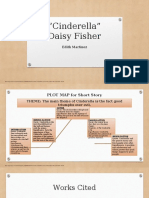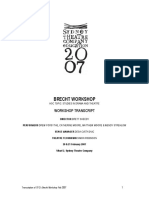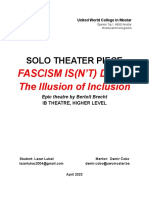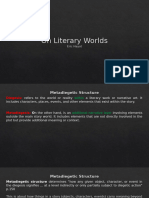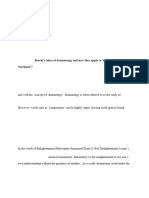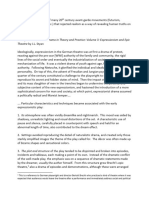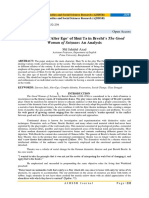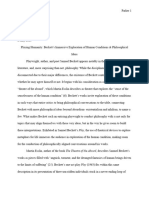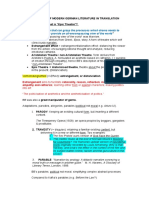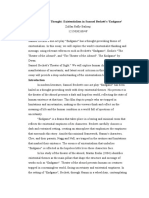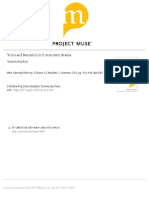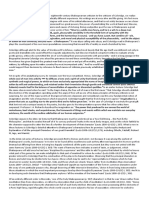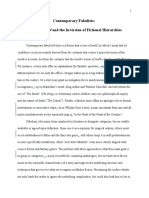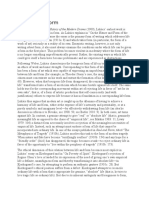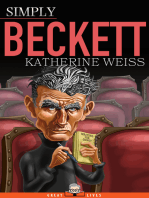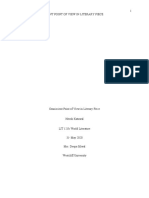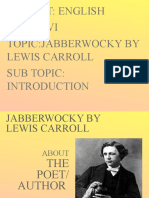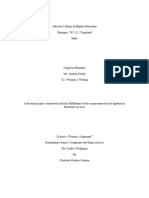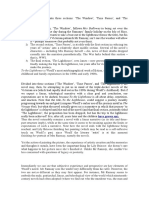Lukacs and Brecht
Lukacs and Brecht
Uploaded by
Anju S KoshyCopyright:
Available Formats
Lukacs and Brecht
Lukacs and Brecht
Uploaded by
Anju S KoshyCopyright
Available Formats
Share this document
Did you find this document useful?
Is this content inappropriate?
Copyright:
Available Formats
Lukacs and Brecht
Lukacs and Brecht
Uploaded by
Anju S KoshyCopyright:
Available Formats
Lukacs
and Brecht
Wednesday, 5 August 2020 9:12 AM
• This sec(on looks at the major ideas put forth by the Hungarian Marxist cri(c Georg
Lukács surrounding socialist realism and how it differs from the views of the German
drama(st/theorist Bertolt Brecht, who is regarded as Lukács' opponent in their views
on realism.
Georg Lukács
• Lukács, the first major Marxist cri(c, regarded literary works to be reflec(ons of an
unfolding system. A realist work must reveal the underlying paKern of contradic(ons in
a social order.
• His view is Marxist in its insistence on the material and historical nature of the
structure of society.
• Lukács’ use of the term ‘reflec(on’ is characteris(c of his work as a whole. That is, the
novel reflects reality, not by depic(ng its mere surface appearance, but by giving us ‘a
truer, more complete, more vivid and more dynamic reflec(on of reality’. To ‘reflect’ is
‘to frame a mental structure’ transposed into words. People ordinarily possess a
reflec(on of reality. However, a novel can help the reader to receive a more concrete
comprehension of reality, which goes beyond a merely common-sense understanding
of things. Nevertheless, the reader is always aware that the work is not itself reality but
rather ‘a special form of reflec(ng reality’.
• Lukács’ view of reflec(on undermines the views of naturalism and modernism. A
randomly presented sequence of images may be interpreted either as an objec&ve and
impar(al reflec(on of reality (as Émile Zola and the other supporters of ‘naturalism’
say) or as a purely subjec&ve impression of reality (as James Joyce and Virginia Woolf
seem to show). Lukács rejects such merely ‘photographic’ representa(on. Instead, for
him, a truly realis(c work gives us a sense of the ‘ar(s(c necessity’ of the images
presented; they possess an ‘intensive totality’ which corresponds to the ‘extensive
totality’ of the world itself. Reality is not a mechanical collision of fragments, but
possesses an ‘order’, which the novelist portrays in a formal whole.
• In a series of brilliant works, especially The Historical Novel (1937) and Studies in
European Realism (1950), Lukács extends his theory, and in The Meaning of
Contemporary Realism (1957) he advances the Communist aKack on modernism. He
refuses to deny Joyce the status of a true ar(st, but asks us to reject his view of history,
and especially his ‘sta(c’ (fixed/unchanging) view of events. According to Lukács, this
failure to consider human existence as part of a dynamic historical environment infects
the whole of contemporary modernism, as reflected in the works of writers such as
Franz Kafa, Samuel BeckeK and William Faulkner (modernist writers). These writers,
he argues, are preoccupied with formal experiment – with montage (the technique of
selec(ng, edi(ng, and piecing together separate sec(ons to form a con(nuous whole),
inner monologues, the technique of ‘stream of consciousness’ (a literary style in which
a character's thoughts, feelings, and reac(ons are depicted in a con(nuous flow), the
use of reportage, diaries, etc. All this formalis(c mastery is the result of a narrow
concern for subjec(ve impressions, a concern which itself stems from the advanced
individualism of late capitalism. This 'aKenua(on of actuality' (reduc(on of reality) is
contrasted to the dynamic and developmental view of society to be found in the great
nineteenth-century novelists and in their successors like Thomas Mann, who, though
not ‘socialist’, achieve a genuinely ‘Cri(cal Realism’.
• Lukács seems unable to perceive that in rendering the impoverished and alienated
existence of modern subjects some modern writers achieve a kind of realism, or at any
rate develop new literary forms and techniques which ar(culate modern reality. Lukács
refused to recognize the literary possibili(es of modernist wri(ngs. During his brief stay
in Berlin during the early 1930s, he found himself aKacking the use of modernist
techniques of montage and reportage in the work of fellow writers, including the
outstanding drama(st Bertolt Brecht.
Bertolt Brecht
• Bertolt Brecht opposed Socialist Realism. His best-known theatrical device, the
alienation effect (Verfremdungseffekt), was related to the Russian Formalists’ concept
of ‘defamiliarization’. He called his theory of realism ‘anti- Aristotelian'. Aristotle
emphasized the universality and unity of the tragic action, and the identification of
audience and hero in empathy which produces a ‘catharsis’ of emotions. Brecht
rejected the entire tradition of ‘Aristotelian’ theatre. The dramatist should avoid a
smoothly interconnected plot and any sense of universality. The facts of social injustice
needed to be presented as if they were shockingly unnatural and totally surprising.
• To avoid lulling the audience into a state of passive acceptance, the illusion of reality
must be shattered by the use of the alienation effect. The actors must not lose
themselves in their roles or seek to promote a purely empathic audience identification.
They must present a role to the audience as both recognizable and unfamiliar, so that a
process of critical assessment can be set in motion. This is not to say that actors should
avoid the use of emotion, but only the resort to empathy. One might contrast this with
the Stanislavskian (Konstantin Stanislavski was a Russian theatre practitioner) ‘method
acting’, which encourages total identification of actor and role.
• The use of gesture is an important way of externalizing a character’s emotions. Gesture
or action is studied and rehearsed as a device for conveying in a striking way the
specific social meaning of a role. The gestures of a Marlon Brando or a James Dean are
personal and idiosyncratic, while a ‘Brechtian’ actor (for example Peter Lorre or Jack
Nicholson) performs rather like a clown or mimic, using diagrammatic gestures which
indicate rather than reveal. In any case, Brecht’s plays, in which the ‘heroes’ are so
often ordinary, tough and unscrupulous, do not encourage the cult of personality.
Mother Courage, Asdak and Sweik are dynamic social beings, but have no focused
‘inner’ life because the foregrounding of a character’s inner life allows its social
meaning to evaporate.
• Brecht rejected the kind of formal unity admired by Lukács.
a. First, Brecht’s ‘epic’ theatre, unlike Aristotle’s tragic theatre (unity of time, place
and action) is composed of loosely linked episodes of the kind to be found in
Shakespeare’s history plays and eighteenth-century picaresque novels. There are
no artificial constraints of time and place, and no ‘well-made’ plots. Contemporary
inspiration came from the cinema (Charlie Chaplin, Buster Keaton, Eisenstein) and
modernist fiction (Joyce and John Dos Passos).
b. Second, Brecht believed that to capture reality the writer must be willing to make
use of formal devices, old and new: ‘We shall take care not to ascribe realism to a
par(cular historical form of novel belonging to a par(cular period, Balzac’s or
Tolstoy’s, for instance, so as to set up purely formal and literary criteria of realism.’
He considered Lukács’ desire to enshrine a par(cular literary form as the only true
model for realism to be dangerous. Brecht would have been the first to admit that,
if his own ‘aliena(on effect’ were to become a formula for realism, it would cease
to be effec(ve. If we copy other realists’ methods, we cease to be realists
ourselves: ‘Methods wear out, s(muli fail. New problems loom up and demand
new techniques. Reality alters; to represent it the means of representa(on must
alter too.’ These remarks express clearly Brecht’s experimental view of aesthe(cs.
• Brecht's search for new ways of shaking audiences out of their complacent passivity
into active engagement was motivated by a dedicated political commitment to
unmasking every new disguise used by the capitalist system.
You might also like
- Book Summary The Rhetoric of FictionDocument11 pagesBook Summary The Rhetoric of FictionMustafa100% (2)
- "Cinderella" Daisy Fisher: Edith MartinezDocument3 pages"Cinderella" Daisy Fisher: Edith MartinezGhulam Nabi50% (4)
- Hexbound WizardDocument3 pagesHexbound WizardChris Nichols33% (3)
- Analysis of A Short Organum To The TheatreDocument5 pagesAnalysis of A Short Organum To The TheatreSanya AgrawalNo ratings yet
- Alienation EffectDocument9 pagesAlienation EffectRadhika KNo ratings yet
- 2007 Brecht WorkshopDocument8 pages2007 Brecht WorkshopIñaki GarmendiaNo ratings yet
- Formalism in Samuel Beckett's Waiting For GodotDocument5 pagesFormalism in Samuel Beckett's Waiting For GodotVictoria AlexandraNo ratings yet
- Timeline of Italian LitDocument7 pagesTimeline of Italian LitSarah Jean100% (1)
- GlossaryDocument4 pagesGlossaryNoha Osman Abd El-hafezNo ratings yet
- Tretiakov - Biography of ObjectDocument6 pagesTretiakov - Biography of ObjectAino KorvensyrjäNo ratings yet
- IB Theatre: The Ilussion of InclusionDocument15 pagesIB Theatre: The Ilussion of InclusionLazar LukacNo ratings yet
- (7 SimCAT) Berkeley's Metaphysics in Hamlet and Beckett's Plays - Aesthetic PerspectivesDocument14 pages(7 SimCAT) Berkeley's Metaphysics in Hamlet and Beckett's Plays - Aesthetic Perspectives15jakashNo ratings yet
- Brecht Epic TheatreDocument6 pagesBrecht Epic Theatrerupal aroraNo ratings yet
- On Literary Worlds Eric HayotDocument13 pagesOn Literary Worlds Eric HayotNur CahyaniNo ratings yet
- Epic TheatreDocument5 pagesEpic Theatremjones4171100% (2)
- Sergei Tretiakov-Biography of ObjectDocument6 pagesSergei Tretiakov-Biography of ObjectAlejandro RamirezNo ratings yet
- The Shakespearean Heroes As The Antecessors of The Heroes of The Theatre of The AbsurdDocument18 pagesThe Shakespearean Heroes As The Antecessors of The Heroes of The Theatre of The AbsurdVirginia VallinaNo ratings yet
- Lukacs - The Sociology of Modern DramaDocument26 pagesLukacs - The Sociology of Modern Dramaspheere100% (1)
- Good Person of Szechwan by Bertolt BrechtDocument4 pagesGood Person of Szechwan by Bertolt BrechtKanika SharmaNo ratings yet
- Modern European Drama AssignmentDocument8 pagesModern European Drama AssignmentAshutosh RanjanNo ratings yet
- ExpressionismDocument5 pagesExpressionismkinghannah267No ratings yet
- Beckett and The Theatre of Pure MeansDocument24 pagesBeckett and The Theatre of Pure Meansjames.a.hansen1968No ratings yet
- Shen Te As An Alter Ego' of Shui Ta in Brecht's The Good Woman of Setzuan: An AnalysisDocument8 pagesShen Te As An Alter Ego' of Shui Ta in Brecht's The Good Woman of Setzuan: An AnalysisAJHSSR JournalNo ratings yet
- Lecture On Threepenny OperaDocument21 pagesLecture On Threepenny Operachubbysurfer100% (2)
- Parker Karina PlayhumanityDocument10 pagesParker Karina Playhumanityapi-702904887No ratings yet
- Brecht's "A Short Organum For The Theatre"Document4 pagesBrecht's "A Short Organum For The Theatre"Sheryl Sadana100% (3)
- Epic TheatreDocument4 pagesEpic TheatreAlina-Alexandra CaprianNo ratings yet
- of EnglishDocument6 pagesof EnglishOriental HippieNo ratings yet
- Epic TheatreDocument3 pagesEpic TheatreAhmad Aqeel SarwarNo ratings yet
- Characteristics of The Theatre of The AbsurdDocument9 pagesCharacteristics of The Theatre of The AbsurdYaSa11No ratings yet
- The Aesthetic EffectDocument12 pagesThe Aesthetic EffectJamie AllenNo ratings yet
- Roopal Bhandari TheGood Person of SzechwanDocument7 pagesRoopal Bhandari TheGood Person of Szechwansmritiagg132No ratings yet
- Brecht Theory and PracticeDocument15 pagesBrecht Theory and PracticeAghadir BakhanNo ratings yet
- The Only Form That Can Grasp The Processes Which Drama Needs To Grasp If It Is To Provide An All-Encompassing View of The WorldDocument6 pagesThe Only Form That Can Grasp The Processes Which Drama Needs To Grasp If It Is To Provide An All-Encompassing View of The WorldMatheus ChyrmangNo ratings yet
- OALibJ 2016071310202811Document7 pagesOALibJ 2016071310202811YashrajNo ratings yet
- Introduction To Drama Final Examination - Zulfan Rafly Baihaqi (1215030268)Document5 pagesIntroduction To Drama Final Examination - Zulfan Rafly Baihaqi (1215030268)Zulfan Rafly BaihaqiNo ratings yet
- Theory of The NovelDocument12 pagesTheory of The NovelastopanomuNo ratings yet
- A. C. Bradley Summary S.TDocument33 pagesA. C. Bradley Summary S.Ta313kiNo ratings yet
- Voice and Narration in Postmodern DramaDocument15 pagesVoice and Narration in Postmodern DramaaaeeNo ratings yet
- 08 - Chapter 4 Inglés PDFDocument67 pages08 - Chapter 4 Inglés PDFAnalía CapdevilaNo ratings yet
- The Epic Theatre by Bertolt BrechtDocument7 pagesThe Epic Theatre by Bertolt BrechtAaditriNo ratings yet
- Coleridge As A Shakespearean Critic 2Document4 pagesColeridge As A Shakespearean Critic 2Anindita karmakarNo ratings yet
- Brecht PresentationDocument19 pagesBrecht PresentationmetafishNo ratings yet
- Waugh 5 What Is 4Document4 pagesWaugh 5 What Is 4Adrian DiazNo ratings yet
- Brecht's - Der Gute Mensch Von Sezuan - Dialectic Toward UtopiaDocument9 pagesBrecht's - Der Gute Mensch Von Sezuan - Dialectic Toward UtopiaAaditriNo ratings yet
- JacquesRancireThePoliticsofFiction GerDocument15 pagesJacquesRancireThePoliticsofFiction GervviandanteNo ratings yet
- Alienation and The Concept of Goodness IDocument7 pagesAlienation and The Concept of Goodness Inimish sharmaNo ratings yet
- Fabulist Essay 1 1Document20 pagesFabulist Essay 1 1api-341231212No ratings yet
- Brian Richardson. Voice and Narration in Postmodern DramaDocument15 pagesBrian Richardson. Voice and Narration in Postmodern DramabiarrodNo ratings yet
- SchezwanDocument27 pagesSchezwanPremNo ratings yet
- 10 BWatt Realismandthe Novel FormDocument2 pages10 BWatt Realismandthe Novel FormSamia BouhdimaNo ratings yet
- Modernist Aspects in Samuel Becketts WaiDocument4 pagesModernist Aspects in Samuel Becketts Waiahamrana60No ratings yet
- Journal of Narrative Theory: This Content Downloaded On Thu, 13 Dec 2012 12:47:42 PM All Use Subject ToDocument19 pagesJournal of Narrative Theory: This Content Downloaded On Thu, 13 Dec 2012 12:47:42 PM All Use Subject ToKritika RamchurnNo ratings yet
- Bela Tarr and DeleuzeDocument10 pagesBela Tarr and DeleuzeGeorges BregvadzeNo ratings yet
- LukacsDocument4 pagesLukacsNavid JMNo ratings yet
- Amireh 1: Rosencrantz and Guildenstern Are Dead, A Play That Belongs To The MetatheaterDocument11 pagesAmireh 1: Rosencrantz and Guildenstern Are Dead, A Play That Belongs To The MetatheaterSONANo ratings yet
- Presentation of Supernatural Elements: A Comparative Study Between Macbeth and The Scarlet LetterDocument9 pagesPresentation of Supernatural Elements: A Comparative Study Between Macbeth and The Scarlet LetterNoura IttidarNo ratings yet
- Brecht Essay U-EffectDocument29 pagesBrecht Essay U-EffectkdlaxsonNo ratings yet
- Machine Estrangement. On Algorithmic Otherness and Architectural Design - Jordi VivaldiDocument16 pagesMachine Estrangement. On Algorithmic Otherness and Architectural Design - Jordi VivaldijordivivaldipieraNo ratings yet
- The Forms of Historical Fiction: Sir Walter Scott and His SuccessorsFrom EverandThe Forms of Historical Fiction: Sir Walter Scott and His SuccessorsRating: 3.5 out of 5 stars3.5/5 (2)
- Dismantling the Divine: D.H. Lawrence, James Joyce, Samuel BeckettFrom EverandDismantling the Divine: D.H. Lawrence, James Joyce, Samuel BeckettRating: 3 out of 5 stars3/5 (1)
- Theme in Film and TV ScreenwritingDocument6 pagesTheme in Film and TV ScreenwritingAkshata SawantNo ratings yet
- B1+ UNITS 1 and 2 LiteratureDocument2 pagesB1+ UNITS 1 and 2 LiteratureXime OlariagaNo ratings yet
- Hotel Juárez: Stories, Rooms and Loops by Daniel ChacónDocument209 pagesHotel Juárez: Stories, Rooms and Loops by Daniel ChacónArte Público PressNo ratings yet
- 5 Books You Will Love If You Like Dramas Like Enola HolmesDocument1 page5 Books You Will Love If You Like Dramas Like Enola HolmesRidhima BhangayNo ratings yet
- A Rose For Emily Plot AnalysisDocument3 pagesA Rose For Emily Plot AnalysisRatihPuspitasari100% (1)
- Writing Pro Target 9 Study PackDocument20 pagesWriting Pro Target 9 Study PackSurya K100% (1)
- English Literature LitDocument9 pagesEnglish Literature LitJayapal ReddyNo ratings yet
- CLA1Document8 pagesCLA1Nitesh KatuwalNo ratings yet
- Between Rhyme and Reason Vladimir Nabokov Translation and Dialogue 1st Edition Shvabrin 2024 Scribd DownloadDocument81 pagesBetween Rhyme and Reason Vladimir Nabokov Translation and Dialogue 1st Edition Shvabrin 2024 Scribd Downloadbikukorueben100% (12)
- Philippine Literature Multiple Choice QuestionsDocument3 pagesPhilippine Literature Multiple Choice QuestionsanalynclarianesNo ratings yet
- This Song Will Be Done in Two Individual Chapters With 2 Different ScenesDocument4 pagesThis Song Will Be Done in Two Individual Chapters With 2 Different ScenesMarts RiveraNo ratings yet
- Ali Baba and The Forty ThievesDocument5 pagesAli Baba and The Forty ThievesNick ValeNo ratings yet
- (Postmodern Studies) Marion May Campbell - Poetic Revolutionaries-Brill - Rodopi (2014)Document324 pages(Postmodern Studies) Marion May Campbell - Poetic Revolutionaries-Brill - Rodopi (2014)gerogiana cojocaruNo ratings yet
- Thomas Hardy's Tragic Vision - January 2016Document181 pagesThomas Hardy's Tragic Vision - January 2016Safete AvdimetajNo ratings yet
- A M - E ' M: Your YourDocument22 pagesA M - E ' M: Your YourBence KlusóczkiNo ratings yet
- "Last Tea" Dorothy Parker (1893-1967)Document3 pages"Last Tea" Dorothy Parker (1893-1967)Анастасия КороленкоNo ratings yet
- TWC DND 5E Character Sheet v1.3Document3 pagesTWC DND 5E Character Sheet v1.3980052287No ratings yet
- The Science of Fairy Tales: Edwin Sidney HartlandDocument181 pagesThe Science of Fairy Tales: Edwin Sidney HartlandGutenberg.org100% (1)
- Buying and Selling: Phone SalesDocument6 pagesBuying and Selling: Phone SalesHenrry GaloNo ratings yet
- The Signalman NotesDocument6 pagesThe Signalman NotesAnonymous heobCWONo ratings yet
- Lewis Carroll and Nonsense VerseDocument16 pagesLewis Carroll and Nonsense VerseKasturi GangulyNo ratings yet
- Quizlet HBFDocument18 pagesQuizlet HBFKhatidja AllyNo ratings yet
- Reading b2 Exercises - Use of Language - 2Document6 pagesReading b2 Exercises - Use of Language - 2joelNo ratings yet
- En MTGM13 RulebookDocument36 pagesEn MTGM13 RulebookcryonicleechNo ratings yet
- Pinocchio NewDocument11 pagesPinocchio NewIndriani Putri PratiwiNo ratings yet
- C11 Research PaperDocument9 pagesC11 Research Paperningsemrumthao3No ratings yet
- Analysis 'To The Lighthouse'Document7 pagesAnalysis 'To The Lighthouse'Bárbara Prado DíazNo ratings yet

